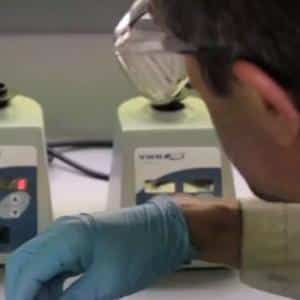 New Michigan dispensary bill poised to adopt testing regulations; will they use the $700/test standards pushed by Randy Richardville and Rick Jones in 2012-s Pharmaceutical Grade Marijuana Act?
New Michigan dispensary bill poised to adopt testing regulations; will they use the $700/test standards pushed by Randy Richardville and Rick Jones in 2012-s Pharmaceutical Grade Marijuana Act?
Representatives have said it. Activists have imagined it was coming. Industry leaders are nervous about the implications of it. The one thing nobody knows yet is, what is a mandatory testing program for Michigan’s medical marijuana going to look like?
We can look into the future by evaluating the past. Senate Majority Leader Randy Richardville (R- Monroe), powerful Senator Rick Jones (R- Grand Ledge) and longtime marijuana foe Sen. Roger Kahn (R- Saginaw) sponsored the Pharmaceutical Grade Marijuana Act (PGM) in 2012; testing standards included in that bill were extensive, harsh and unobtainable by Michigan’s current marijuana testing industry. The bill was never brought up for a vote.
2013-s House Bill 4271 is called The Provisioning Centers Act (PCA), a bill designed to allow distribution centers to sell medical marijuana to licensed patients in Michigan. The bill failed to gain any traction in 2012 but in 2013, PCA sponsor Representative Michael Callton (R-Nashville) has garnered some pretty heavy duty support from other House Reps- including a Republican contingent that is pushing to move this bill through the legislature.
To get a bill passed in 2013 Michigan means you have to compromise- and on the issue of marijuana, any positive law that gets passed will have to be seriously compromised to get votes. The Republican-controlled House and Senate are filled with old school drug warriors that haven’t brought their attitudes toward the medicinal use of marijuana in line with societal thinking.
HB 4271 is stuck in Committee- the House Judiciary Committee, to be exact. When Callton announcedearlier this year that his bill would be heard in Committee and even voted on, it was a bittersweet mixture of excitement and trepidation: what was sacrificed to gain this vote? Callton announced that members of the Committee- Republican members- were suggesting mandatory testing of marijuana had to be included for the bill to move forward. Questions exist as to what the testing requirements will be, and Callton has not provided a revised version of HB 4271 for evaluation.
Last year’s bill to create a Pharmaceutical Grade Medical Cannabis industry in Michigan contained exhaustive and cumbersome regulations. The PGM would have created a parallel industry which required a patient registration and business certification system completely separate from the Michigan Medical Marihuana Act (MMA). This parallel system would have mandated some very tough requirements- including testing standards that no current marijuana testing company in Michigan could satisfy.
“It is very important that every patient have access to medicine that have been screened or tested for safety in order to obtain healthful products. We do need to be sure that such testing is affordable and achievable,” said Robin Schneider of the Michigan-based National Patients Rights Association (NPRA).
Current testing standards available in Michigan do not include the ability to test for many of these substances; a ‘plate test’ involves a petri dish, an incubator and other laboratory equipment that are not used by marijuana testing facilities like the Michigan Testing Authority, Iron Labs or Cannalytics.
“I would have to purchase a machine that would cost me $250,000,” to be in compliance with just the metals component of these standards, said Ken Beyer of MTA. “Similar testing in Massachusetts costs $700 per test.” Neither of those figures include the costs of plate testing, which is not required in Massachusetts. These additional costs may make the cannabis distributed through the Provisioning Centers so expensive that legal patients will be driven away from places of safe access and back to the black market.
Where did these standards come from? They were a Senate creation.
The House of Representatives had their 2012 version of the PCA- HB 5681- which did NOT include these exhaustive testing standards. Even if the compromises Callton is willing to make to advance this bill out of the House include reasonable testing standards that are acceptable to the marijuana community, there is no guarantee that Richardville and Jones will not force adoption of some of the PGM standards to ensure the bill’s passage through the Senate.
When SB 1349 was introduced medical marijuana organizations were outraged. An article from the MMJ Business Daily in June of 2012 reports:
The NPRA came out against the bill this week, saying it was “introduced under the guise of helping ensure the quality and purity of medical marijuana” but that in reality it “would essentially lead to the equivalent of a big box retailer opening next door to a small family-owned business.” In other words, the bill would make it nearly impossible for smaller businesses and caregivers to meet costly requirements for obtaining a license to distribute medical marijuana.
If this year’s Provisioning Centers Act becomes a vehicle for the Pharmaceutical Grade Marijuana Act’s most anti-patient and anti-business components, it’s sponsors can expect to lose the support of the medical marijuana community very quickly. Senator Jones- who introduced a bill to remove glaucoma as a qualifying condition for medical marijuana use- and Senator Kahn- who was a sponsor of anti-medical marijuana legislation in 2009 and 2010- are certainly poised to force their hand on the issue.
Jones is the chairman of the Senate Judiciary Committee, an obstacle the PCA must endure before the full Senate has a chance to vote on the bill. Kahn is a player whose influence should not be underestimated, but Senator Richardville is the man with the final say on the entire process. He decides which bills are brought before the Senate for a vote; it is his approval that will need to be satisfied before the Provisioning Centers Act can become law.
Source: The Compassion Chronicles







